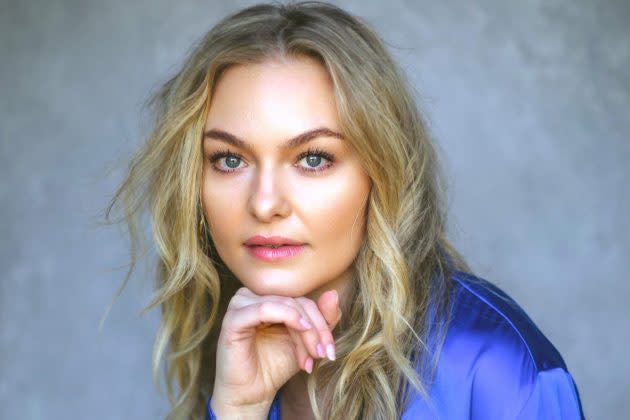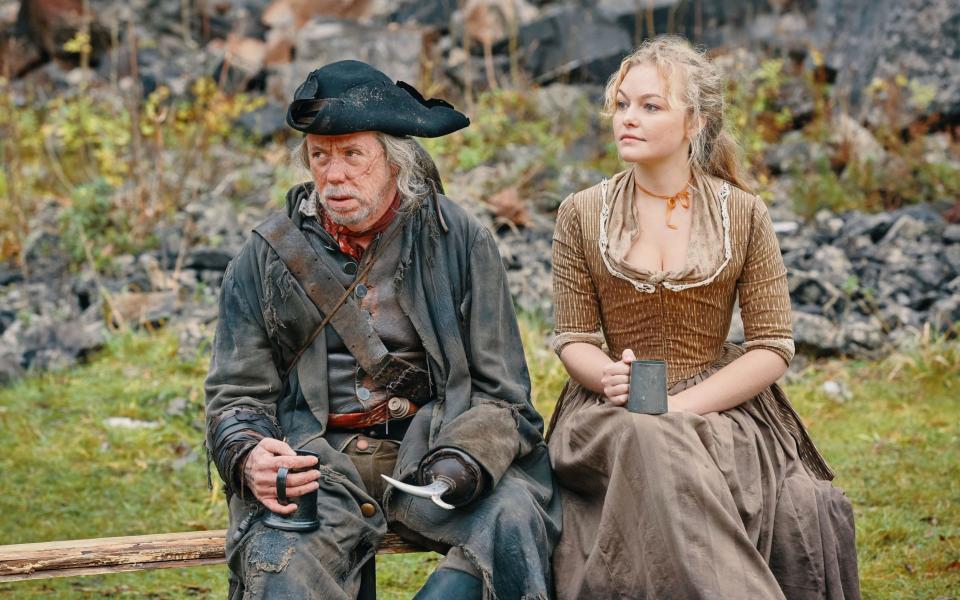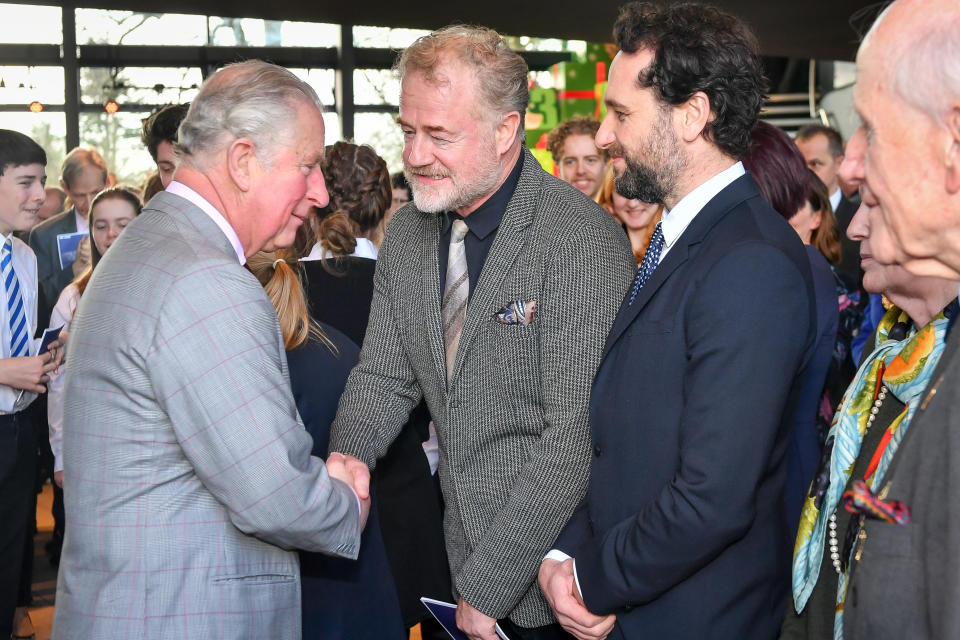‘Poldark’ Star Ciara Charteris Reveals She Left Drama School After Female Students Were Groped By Classmates Wearing A “Rape Mask”
- Oops!Something went wrong.Please try again later.
- Oops!Something went wrong.Please try again later.

EXCLUSIVE: Ciara Charteris went to drama school with her eyes wide open. Born into a dynasty of talent agents, the Poldark actress-turned-safety advocate grew up steeped in stagecraft. “I entered drama school with a lot of privilege and knowledge of the industry,” she recalls. “It meant I was very aware of what was wrong immediately.”
Charteris left home to join the Royal Welsh College of Music & Drama in 2013. A decade earlier, Queen Elizabeth II gave the school its royal status to mark her 50th year on the throne. Its hallowed halls were once home to Anthony Hopkins, marking the start of a career that would take The Silence of the Lambs star to double Oscar glory.
More from Deadline
Like Hopkins who went before her, Charteris says drama school students are thrown into an “adult realm” designed to break down inhibitions and channel trauma into dramatic performance. “The fundamental grounding of the courses themselves are built on things that are trying to strip a person of their natural rights, their physical rights, their gut instincts. It’s all about letting those things go in literal, practical exercise form,” she says of her experience.
Speaking to Deadline as part of our Drama Schools Uncovered series, Charteris says this environment created “monsters” among her classmates. These individuals were empowered to take advantage of more vulnerable students — all under the explicit instruction of tutors.
The most obvious example of this, she says, was during “mask work” when undergraduates were asked to improvise in different disguises. One of the face coverings was universally known at Royal Welsh as the “rape mask” and it was usually embodied by male students. This was a troubling proposition for Charteris’ year group because men outnumbered women by nearly two to one.
“The majority of the time the male members of the class would have access to that mask, and the work is all about embodying how that mask makes you feel. This one was known as the rape mask,” Charteris says. “You would see female students get cornered in a room and get touched or groped, and it was perfectly acceptable in the context of this class.”
The daughter of Roger Charteris, who runs agency The Artists Partnership, she describes herself as a “loud mouth” in lessons who railed against safeguarding issues. Others at Royal Welsh referred to her as the “ice queen” because of her propensity for saying “no” in a culture that demanded students say “yes.”

If she wasn’t walking out of mask classes in protest, she was fleeing some acting exercises in tears. Charteris, whose other credits include Endeavour and Grantchester, recalls one character study task that would not look out of place on an episode of Love Island, the sex-obsessed ITV dating show.
Female students were asked to line up and mime taking off their clothes. Male students were told to imagine their classmates getting naked and essentially pick the woman they deemed to be most attractive. “Some people were not walked towards. Myself and another classmate burst into tears and ran out,” she says. “I cannot for the life of me remember the purpose of this exercise.”
Of her male contemporaries, she says: “We had some seriously dangerous people in our year. When these figures were given these scenarios in a workplace environment, it was scary. We were all very young and impressionable… but really dark characters were given the freedom to be a version of their own monster.”
Charteris accuses tutors, both male and female, of behaving inappropriately. She did not name individuals, but says she witnessed a male teacher proposition her friend during a lunch break, alleging that he said: “If I wasn’t married, I would have you.”
She claimed that another male tutor objectified a student for having “better tits” than a famous actress during a movement module in her second year. Charteris alleged that a female tutor would touch students without their consent. She also experienced regular comments about her weight.
She resigned from Royal Welsh in her second year after taking an acting job on Stephen Poliakoff’s BBC series Close to the Enemy. She penned a valedictory letter raising her concerns to the school. “I have a very hard shell and feel very passionately about speaking out,” she adds.
Charteris was one of many students and graduates who shared their stories with Deadline for our Drama Schools Uncovered investigation. We revealed this week how 11 of the UK’s most prestigious drama schools have received nearly 100 complaints about sexual misconduct and discrimination over the past three years. Royal Welsh received two sexual harassment complaints during this period, one of which was partially upheld.

Charteris’ story has echoes of an ongoing legal case brought against Royal Welsh by two female students. Alyse McCamish and Sydney Feder said the school responded “appallingly” to their allegations about the predatory behavior of a male student. In their lawsuit, they said it was part of a “toxic environment” in which unsolicited contact was excused as “part of the student/acting experience.” They are claiming thousands of pounds in damages and a ruling is expected imminently.
The school told Deadline that it had “transformed” the way supports and safeguards students over the past three years, as well as making changes to complaints procedures.
It said: “We’ve introduced new guidelines for close contact and intimacy in teaching and production work, created with leading external experts. Staff are trained in inclusive practice and intimacy work, to ensure the learning environment is safe.
“We’ve established an improved confidential feedback/complaints system enabling students and staff to record concerns at any time, anonymously if they prefer. On receiving a complaint or concern we immediately make sure that anyone involved is safe and supported, and we consider whether external experts should be involved.
“Our enhanced professional student services team of mentors and tutors now have a range of specialist skills. They operate alongside a Student Voice Officer who works directly with our students. Following a major review and revalidation, our undergraduate Actor training course, fronted by a new team, has just received 100% satisfaction rating in the National Student Survey.
“We will never stop listening to and working with our staff and students or learning from others to make sure our culture is one in which students can learn and thrive, while being professionally challenged in a safe and supportive environment.”
Charteris says she has had “sickening” conversations with recent Royal Welsh graduates, suggesting some students are still having troubling experiences. She believes that tougher regulation is essential, but worries that schools will protest by arguing that more rules will damage artistic processes.
Charteris thinks that safety and success are compatible. It is something she is advocating through her wellbeing hub IntAct Creatives, which campaigns for industry safeguarding and organizes “Story Slam” events in which people share their experiences of working in the creative industries.
“I don’t believe that in order to be an incredible actor or actress you have to lose all boundaries or morals,” she says. “The safer a student feels, the more artistic freedom you’re going to find they have.”
Charteris adds that better standards in schools could help the whole acting profession, which she says isn’t “too sweet” either when it comes to preventing inappropriate behavior. Eight years after leaving drama school, Charteris’ eyes remain wide open.
Click here to read more from our Drama Schools Uncovered series. If you wish to contact the author of this article to share your drama school experience or supply further information, please email jkanter@deadline.com
Best of Deadline
SAG-AFTRA Interim Agreements: Full List Of Movies And TV Series
2023 Premiere Dates For New & Returning Series On Broadcast, Cable & Streaming
Sign up for Deadline's Newsletter. For the latest news, follow us on Facebook, Twitter, and Instagram.

